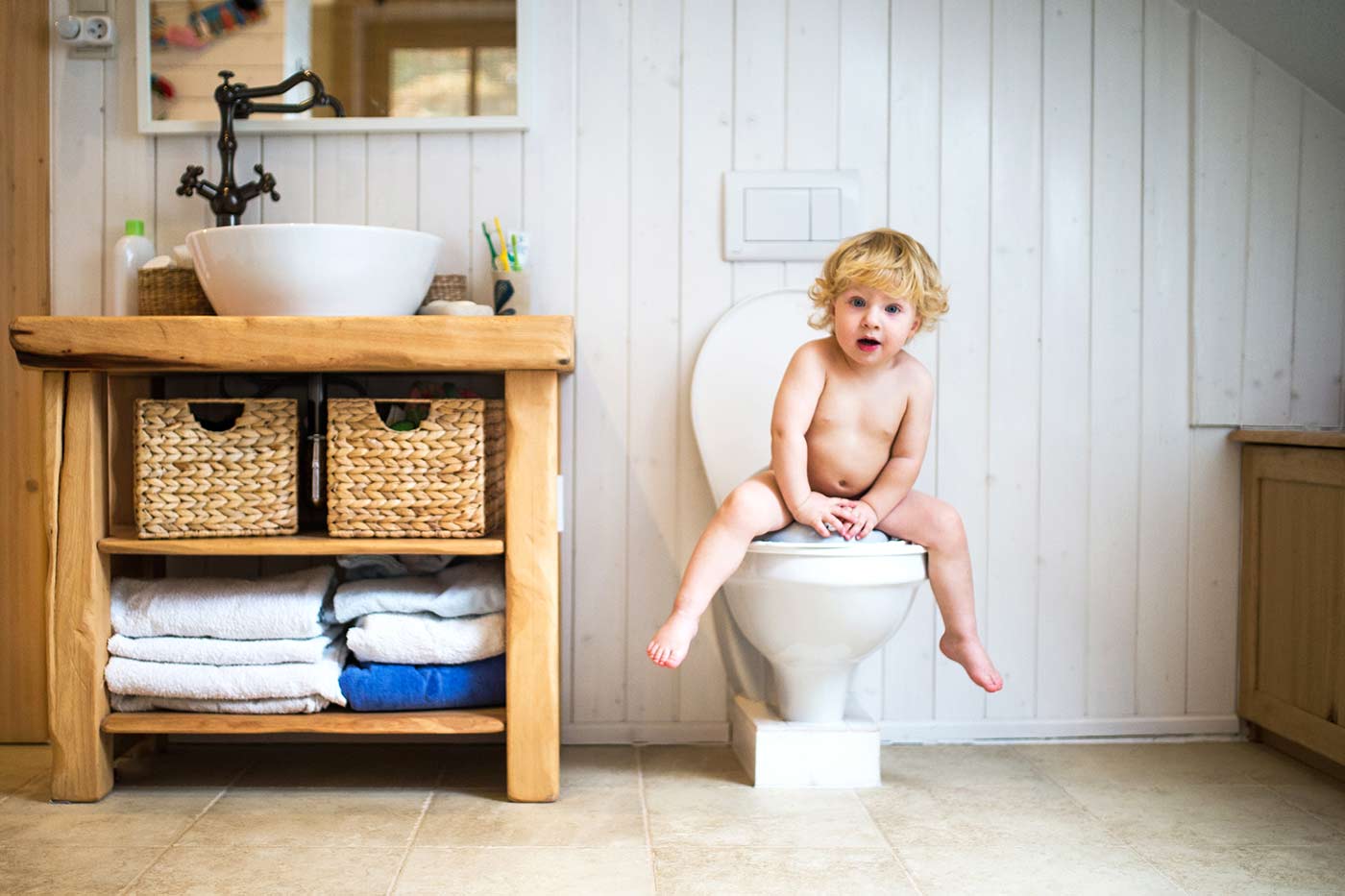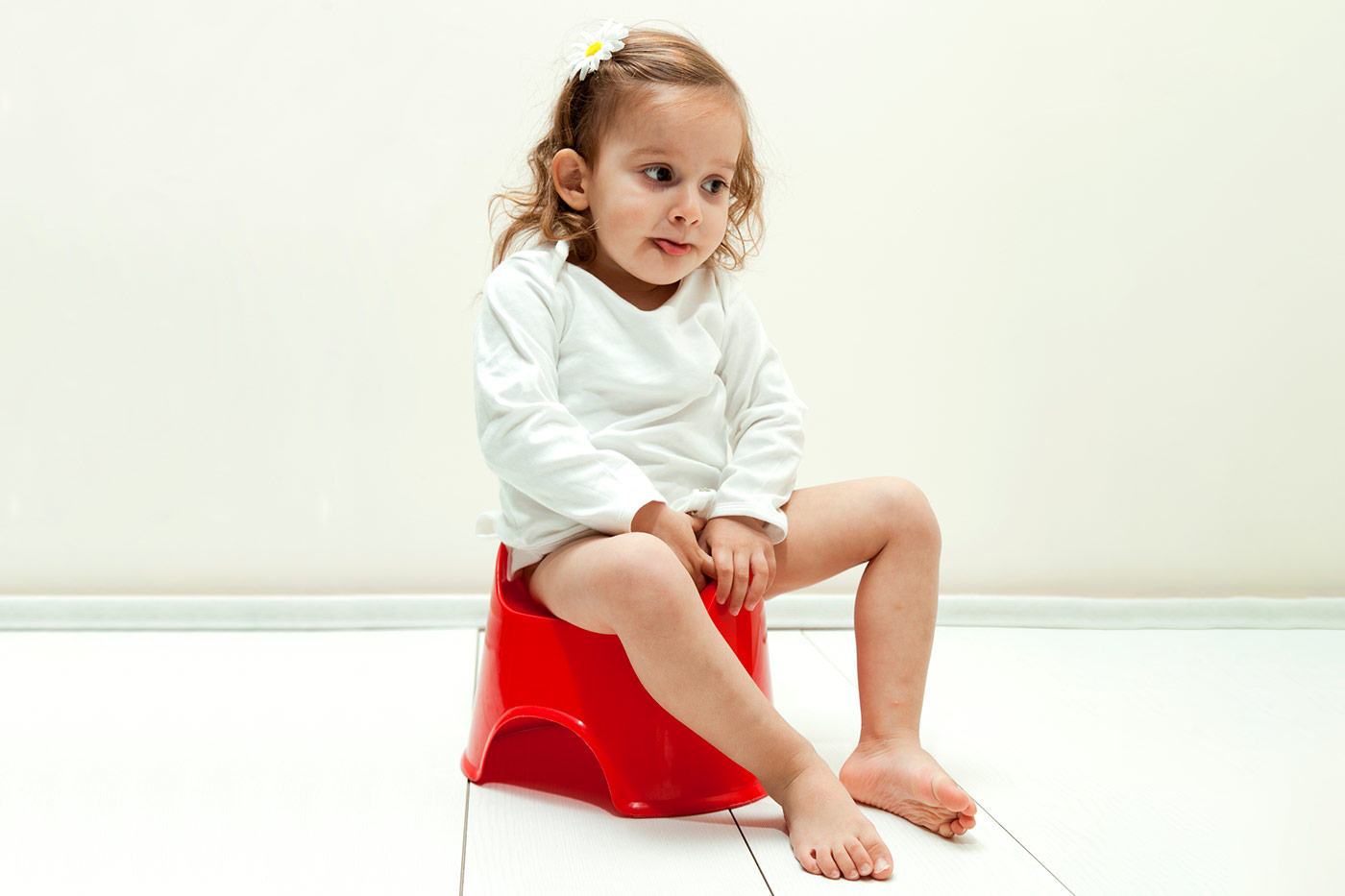What to Do When Your 3 Year Old Won’t Poop on the Potty
Can’t get your child to poop in the toilet? Learn how to handle the anxiety and defiance when your 3 year old won’t poop on the potty.
 I had potty-trained my 3 year old over a weekend, and miraculously, it worked. Barring the occasional accident here and there, we were able to ditch diapers for good.
I had potty-trained my 3 year old over a weekend, and miraculously, it worked. Barring the occasional accident here and there, we were able to ditch diapers for good.
Except… those accidents? Over time, they became less about peeing accidents and more about pooping. He sure knew when to use the potty to pee, but still had the same accidents when it came to poop.
I mentioned it to his pediatrician, who reassured me: “Getting the hang of pooping in the potty can take up to a year.”
While I didn’t like the thought of cleaning poop accidents for the next year, I felt less stressed knowing that this was normal. And she didn’t mean that it’d be this messy for an entire year before he’d finally stop. Instead, the accidents will get fewer as the year progresses, before they eventually stop completely.
And she was right. By that one-year mark, he was pooping regularly in the toilet.
But we didn’t just wait that entire year doing nothing, either. We tried several techniques to make pooping in the potty much easier on our 3 year old. These strategies reduced those accidents as the year went by, so much so that I had almost forgotten we had these problems just a few short months ago.
Take a look at these tips to help when your 3 year old won’t poop on the potty. As one parent said about the article:
“Thank you so much. This was so helpful and I totally have a different outlook now on how to handle, and more importantly, on how to treat my son.” -Nthuseng
Table of Contents
1. Manage your emotions
In hindsight, it’s almost comical to think about the range of emotions we feel—outright anger, hints of failure—because of potty training. All this even as we know that they absolutely will learn to poop in the potty (you’ve never seen a fifth grader still potty training, right?).
Still, when your 3 year old won’t poop on the potty, all the feelings start to come up, so it becomes even more important to manage them during these moments.
For instance, talk about pooping in the potty as a positive thing—something he gets to do—rather than a drag or point of contention between you two. Keep your emotions neutral (even though you’re quietly wondering how many potty training accidents are normal). This way, he won’t feel discouraged, defeated, or ready to argue back.
And it’s not just anger, either. If you’re like me, the sight and especially the smell of poop instantly makes your nose curl in disgust. Understandably so, but try not to act disgusted when you’re dealing with poop, from cleaning accidents to scooping it into the toilet.
Managing your emotions reminds him that pooping in the potty doesn’t have to be stressful and shouldn’t be cause for arguments. Consider this the hardest part of potty training—staying calm even when all you want to do is get upset.
Free email course: Want to potty train without the power struggles? Grab my free 5-day email course, Peaceful Potty Training! No more putting unrealistic deadlines on your child or using rewards that eventually fizzle. Join my newsletter and sign up for the email course now:
2. Address your child’s feelings
Disclosure: This article contains affiliate links. As an Amazon Associate, I earn from qualifying purchases.
We often get frustrated, annoyed, or downright angry when kids refuse to use the potty or have accidents. “Another accident?!” we say in exasperation. Or we crinkle our noses at the mess to clean up, building up anger and even resentment.
But for many kids, the refusal to poop in the potty stems not from defiance, but from legitimate anxieties and fears. They may not be equipped to express these emotions, much less understand why they feel the way they do. Instead, they cry, refuse, and melt down.
Maybe your 3 year old won’t potty train because he dreads the physical pain of pushing. He might feel awkward sitting on a huge toilet or confused about this new way of pooping. These are all valid concerns that can get brushed aside when you focus only on his behavior, and not the root cause of it.
Address these anxieties to help him feel comfortable. Read books like It Hurts When I Poop! by Howard Bennett to talk about his fears. Show empathy and share how other kids have felt scared, too. And let him know that however different pooping in the potty is, it’ll eventually feel normal.
3. Help your child relax
Sometimes the pressure to poop in the potty is so strong that your child feels too wound up to make it happen.
The thing is, her body needs to relax for poop to pass—even if she does eventually have to push, she still needs to relax to get to that point. Added stress won’t help her feel comfortable to poop in the first place.
Instead, help her relax by offering something to look at. Books to read, a tablet to play with—anything to keep her focus away from the pressure to poop. You might even designate certain toys that she can only play with in the bathroom to keep her distracted and enjoy sitting on the potty.
And don’t forget to prop her feet with a step stool to make sure her knees are level with or higher than her hips. You can imagine how uncomfortable it is to poop with your legs dangling and your body sliding forward.
4. Make potty time a regular part of your routine
We’ve all done it: brushed our teeth even though we’ve already done it, turned left at the intersection like we usually do even though we needed to go right. We’re creatures of habit, and usually for the better.
The same is true for your child. The more regularly he goes to the potty—even just to sit on it—the more normal and automatic it’ll feel for him. He doesn’t have to think about whether to sit on the potty or not—he’ll do so on his own.
The result? He has one less thing to focus on or argue about.
Does he tend to poop in his pull-ups at certain times, like first thing in the morning or after a nap? Make it a habit to bring him to the potty every day during those times. Just as he washes his hands before meals or takes a bath before bed, going to the potty can be a regular part of his routine.
5. Ease your child’s constipation
Potty training resistance can often occur because of constipation. The physical strain can even traumatize them into thinking pooping will always be painful.
Ease your child’s constipation by adding more fiber to his meals, especially “P” fruits like pears, plums, peaches, and prunes, as well as vegetables and whole grains.
Don’t forget to offer plenty of water as well. I’d give my kids a sippy cup of water around the house. Having water on hand nearly all the time helped them finally pass poop.
Lastly, make sure your child gets plenty of exercise to help with his bowel movements. Encourage physical play that gets him moving (check out these physical activities perfect for 3 year olds).
6. Stop using diapers completely
Yes, dirty undies are horrible and inconvenient to clean compared to the ease of tossing a diaper after an accident. But consider this: each time you relent to using diapers, you’re severing the commitment your child has to poop in the potty.
Staying consistent and removing diapers cold turkey sends the message that she’ll be wearing undies from now on with no question about it. This strengthens her resolve—and clears up any confusion—about whether she can still rely on diapers as a backup.
That said, diapers and pull-ups are fine to use for sleep. Our pediatrician reminded us that kids can’t be potty trained during sleep and that they’ll eventually learn to stay dry at night. But for daytime use, ditch the diapers, especially if you told your child you would.
Learn how to potty train in just three days.
7. Give your child a pep talk
At the end of the day, you and your child are on the same team. Remembering this can help you change the way you talk to her, including offering more support and less judgment and arguments.
Let’s say your 3 1/2 year old is not potty trained yet. As her “coach,” remind her of the many things she can do once she can poop in the potty.
She can stay out longer during outings instead of coming home in case she has an accident. She can wear fun undies with her favorite characters. And she can even avoid the hassles of changing pull-ups by pooping directly in the toilet.
Praise her not just for the times she poops in the potty, but for any progress she has made, such as trying to poop or unbuttoning her pants. And as always, let her know that mistakes and accidents will happen, but that you’ll help her learn from and manage them.
Conclusion
We can all agree that life can get challenging when your “threenager” won’t poop on potty. But as you can see, with small but significant changes, you can help her overcome her barriers, ditch the diapers, and stop having accidents.
Start by looking at her anxieties and fears—what we see as misbehavior often stems from deeper emotions. Help her relax by providing distractions and setting up her posture to poop easily. Make potty time a regular part of her day so it becomes less of a power struggle.
Address constipation issues by changing her diet, offering more water, and encouraging exercise. Ditch the diapers completely—consistency sends a strong message and avoids confusion.
Manage your emotions, from staying calm to avoiding being disgusted. And finally, give her a pep talk—remind her of the positives of pooping in the potty and show support regardless of what happens.
You may have been changing diapers for years at this point, but now you can rest assured that you won’t be doing so for much longer.
Get more tips:
- 6 Signs Your Child Is Not Ready for Potty Training
- When to Stop Potty Training and Wait
- How to Handle Potty Training Poop Anxiety
- 8 Simple Ways to Start Preparing for Potty Training
- Potty Training Twins: The Ultimate Guide
Don’t forget: Join the FREE 5-day email course, Peaceful Potty Training and potty train without frustrating power struggles:



